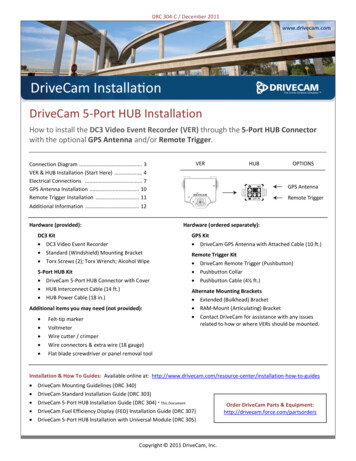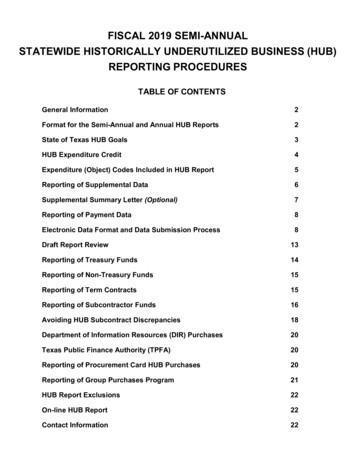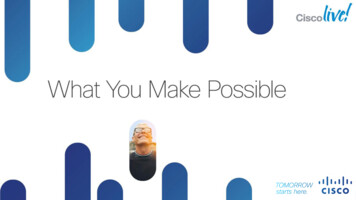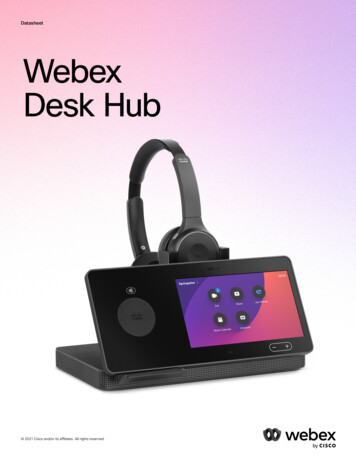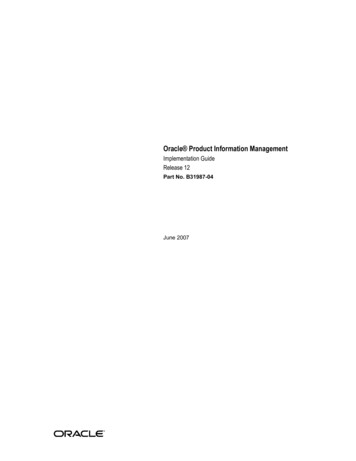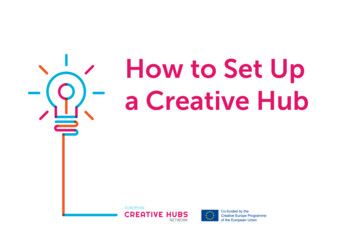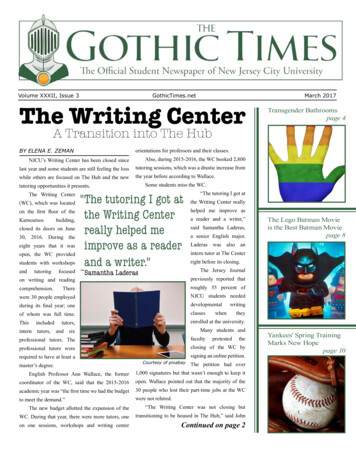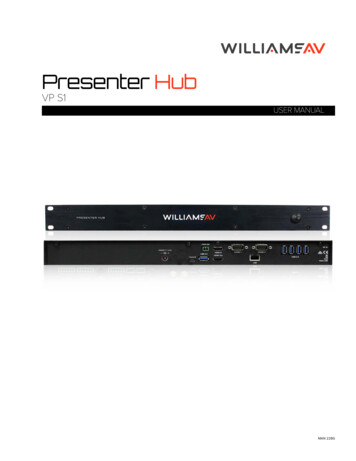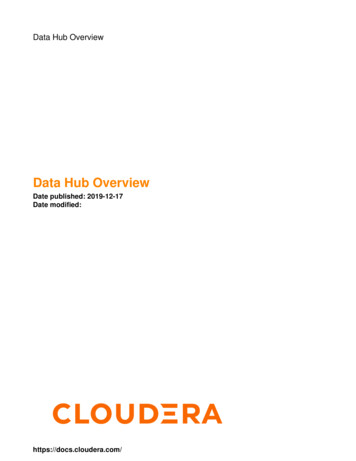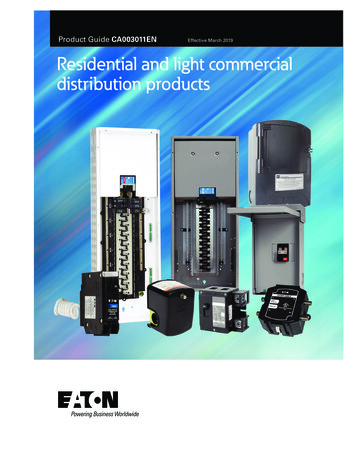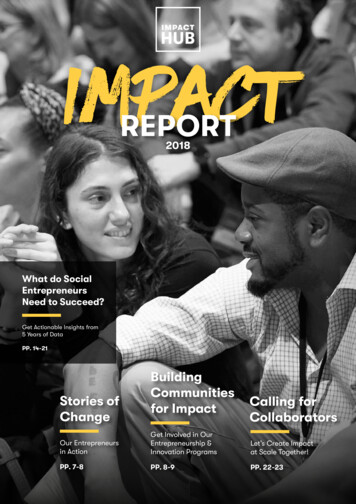
Transcription
ImpactREPORT2018What do SocialEntrepreneursNeed to Succeed?Get Actionable Insights from5 Years of DataPP. 14-21Stories ofChangeBuildingCommunitiesfor ImpactCalling forCollaboratorsOur Entrepreneursin ActionGet Involved in OurEntrepreneurship &Innovation ProgramsLet’s Create Impactat Scale Together!PP. 7-8PP. 8-9PP. 22-231
BuildingCommunities forImpactThe Impact HubStory6Stories ofImpactOur entrepreneurs in action2118Partneringfor ImpactHow wecollaborate forimpact at scale10Five ThingsYou Didn’tKnow AboutUsLessonsLearnedInsights from10 yearsof buildingimpactfulcommunities12Resiliencein ActionDevelopingentrepreneurialecosystemswith strongpartnerships14WHAT’S #NEXTInspireConnectEnable4What doSocial EntrepreneursNeed toSucceed?Uncoveringinsights from5 years of datawith WU Vienna22Let’sCollaboratefor Impactat ScaleImpactIn Your HandsAs history demonstrates, humans succeed in large-scale collaboration when it istruly needed. Now is one of those moments.Our world is being called to tackle urgent social and environmental issues whilefacing significant disruption to governance and economies, leading to a keyopportunity for transformative system change. We believe the only way forwardis by joining forces to build a future where business and profit work in support ofpeople and planet. That’s why we created the world’s largest acceleration andcollaboration platform for positive change — the Impact Hub network.With 100 impact communities in cities all around the world,we are ready to seize the moment.In every city, we put impact entrepreneurs at the center of our efforts,surrounding them with a supportive community. We build with and for thesecommunities, creating collaborative ecosystems that capture the strengths ofbusinesses, institutions, policymakers, and unlikely allies. We then connect theselocal ecosystems with our 16,000-member, virtually-linked global community ofchangemakers, which reaches more than 40 million people.Using the common language of the Global Sustainable Development Goals(SDGs), we are not only mobilizing our locally-rooted Impact Hubs in 50 countries, on five continents, but also sparking joint action on key issues withcross-sector partners and other networks. Because we need everyone.Building this future is a journey of learning for all of us. We aim to buildecosystems, so codifying and sharing our insights and lessons learned is key(see p. 11). In this spirit, we are proud to share five years of insights into thesupport needs of social entrepreneurs, created with our partners at the SocialEntrepreneurship Center of WU Vienna (see pp. 14-21).These learnings continue to inform our activities and partnerships, offeringmany opportunities to get involved (see pp. 8-9).The next pages will both showcase and explore the paths we can all followto scale meaningful impact collaborations — to create the future we need.Together.Read, get inspired, and let’s collaborate!Your Impact Hub Network3
Story DNAThe Impact HubDriven by the opportunity of a new millennium, a young,idealistic group of graduates from Wales’ Atlantic Collegedecided to test the boundaries of the status quo. SecuringLondon’s Royal Festival Hall for a Year 2000 event, theywanted to initiate debate on the connections between globalenvironmental, social, and political issues, persuading NobelPrize winners and influential thinkers to speak. Even the DalaiLama was enlisted for a video address.ber support but instead was full of people eager to find outhow to open their own local Hubs all over the world.OurPartnerInspiring PlacesJoining Forces forImpactAn Impact Movement Is BornSo the team examined the principles of space co-creationand community building that were born in Soweto and testedin London, curious to see if Hubs might also work elsewhere.We are a network ofBy 2008, there were nine Hubs on three continents.The People's SummitTheir boldness saw them invited to host an NGO event forthe 2002 United Nations World Summit on SustainableDevelopment in Johannesburg. But instead of accepting thefaceless conference venue they were offered, they choseto create an alternative — a people’s summit. They joinedforces with local activists in Soweto who were transforminga township wasteland into the Soweto Mountain of Hope aka‘SoMoHo’, an arts, environmental education and communityhub, which outshone the UN summit and touched heads ofstate, as well as UN Secretary-General Kofi Annan.Back in the UK, they wondered how they could bring theseperspectives into the world of work, and thereby help peopleconsider more purposeful careers that tackle urgent worldissues. Looking into it, it hit them: People were already trying to action impactful ideas from their kitchen tables, notreaching their potential in isolation. Their growing group ofcollaborators changed this in 2005, when they found a spaceto bring these isolated entrepreneurs and innovators together— a run-down London loft that would house the forerunner ofImpact Hub.Hub MagnetismThe concept of ‘The Hub’ came to life, bringing changemakerstogether with the shared workspace, community, and eventsneeded to advance their ideas and create new collaborations. Soon transformed with a community-designed interiordrawing on recycled and reused materials, The Hub metLondon impact makers’ needs for a collective action spaceand quickly filled up.A matter of months later, The Hub’s rapid growth made itshosts reach out to their networks, keen to discuss how to bestsupport their expanding impact community. To their surprise,the resulting gathering in 2007 had little to do with just mem-spotlightThe new spaces became rallying points for people passionateabout building a radically better world, and the new Hubfounders also connected — seeking inspiration in Londonand traveling to each other’s spaces to find out how to turnsocietal challenges into opportunities.Dozens of would-be Hubs emerged with the 2009 creation ofa centralized body in London, which envisioned the bloomingnetwork of Hubs developing as social franchises. But, by2010, the founding teams came to a realization: Their futurehad to be a collective one.inImpact Hubs hosted100 11,000 IMPACT HUBSEVENTSin 2016 alone50 COUNTRIES5CONTINENTSVibrant Community16,000 MEMBERSCollective Growthfrom diverse andcomplementarybackgroundsThis realization sparked a leadership movement, unleashing achain of events that led to the creation of a bottom-up, democratic governance model. It came to life in late 2011, markingthe Hubs’ transformation into a genuine collective: one with aco-leadership structure and shared practices to shape a newway of doing business together, in and for the world.In 2013, the empowered network reinforced its focus onpurpose-driven innovation and, with this, chose a morefitting name: Impact Hub. Over the next four years, ImpactHub expanded its global reach and more than doubled itscommunity of entrepreneurs and innovators to over 16,000members across the globe. Instilling conscious leadershiparound social and business innovation, Impact Hubs inspire,connect and enable positive change across diverse contextsand economies to prove that the future of business is found inprofit that serves people and the planet.across To meet some ofour members, seepp. 6-760%of them value social andenvironmental return overfinancial return“67%of all members founded theirown ventures, giving peersupport equivalent to 420 FTEsImpact Acceleration6,400 Delivering over200STARTUPSPROGRAMS ANNUALLY,were foundedat Impact Hubsbetween 2012 and2016we are one of the world’s largestmulti-stakeholder communitiesand accelerators for socialimpact, with a unique globalreach across developed andemerging marketsIn 2018, as a truly global network, it is now tackling its nextchallenge: Impact at scale.A future in which humansand nature live in harmony“can’t be done alone”,which is why WWF entersinto global partnershipswith organizations likeImpact Hub, statesThomas Vellacott, CEO ofWWF Switzerland. To learn more about ourprograms, see pp. 8-9A few years ago, we realized that weneeded to engage much more withentrepreneurs and together developsolutions to environmental challengeslike climate change,” recalls Vellacott.“Impact Hub is a great partner becausethey challenge us to look at new ways ofdoing things and link us to entrepreneursworking on the topics we care about. It’sa great way of combining complementaryskills in pursuit of shared goals."WWF, the World Wildlife Fund, is one ofImpact Hub’s very first global partners— WWF Switzerland supported both the2010 foundation of Impact Hub Zurich andImpact Hub’s network transition in 2011.This promising collaboration soon createdjoint programs in many parts of theworld — now 20 and counting — to inspire,accelerate, and scale entrepreneurialsolutions with transformative impact onenvironmental challenges. With these, theWWF–Impact Hub partnership has so farsupported 160 innovative ventures tacklingissues like plastic pollution in oceans,deforestation, and unsustainable businesssupply chains. Learn more about this and other strategicpartnerships on pp. 8-9 to find ways tocollaborateUnlikely Allies held30 would-beGlobally-generatedOpening of the firstThe network addsin Seattle, USA.Launch of newGlobal event withstrategic direction,founders meet inThe first SouthFirst Hubs in AfricaThe first partnersrevenues break theHub in Asia. The“Impact” to its66 Impact Hubs10 years of impact,300 participantsLondon to find outAmerican Hub(Johannesburg)jump on board 5 million mark asglobal communityname, to emphasizewith 11,000 generating network-which was piloted100 globally-to create Impact atHub No. 1 opens inhow to create localopens in São Paulo,and North America see “Partnerthe new networkexceeds 5,000its purpose-drivenmembers aroundwide revenuesin Cluj-Napoca,connected ImpactScaleIslington, LondonHub communitiesBrazil(Berkeley) openSpotlight”model comes to lifemembersmissionthe worldtopping 28 millionRO in 2015Hubs! see pp. 01720184Impact Hub #Next5
StoriesRECIPEOf ImpactFor ChangeFounderCEO & FounderFounderDirector & Co-FounderCTO & Co-FounderImad Elabdala,KIDNOVATIONStacy Flynn,EVRNUSidiki Sow,PROTERA FARMSCorinna Grace,SERESMatthew Cua,SKYEYEAs a Syrian engineer adapting to lifein Sweden, Imad Elabdala studied thepsychology behind Post TraumaticStress Disorder (PTSD) to help himselfdeal with his experiences as a refugee.“The process took two years, but thenI thought, what about the kids backthere in Syria? And the 27 million kidsliving as refugees around the world?Less than 5% of them get psychosocial support.”Stacy Flynn had worked for bigtextile corporations for half of her life.However, a 2010 business trip to Chinashowed her that her industry wasan environmental disaster:“Making a simple cotton shirtrequires 700 gallons [2650liters] of fresh, clean water!”Young Malian agronomist Sidiki Sowfirst discovered the power of edibleinsects during his studies in Montréal.He immediately saw its vast potentialfor use as animal feed, to cut downon the heavy land use, waste, andgreenhouse gas emissions of livestockfarming.Transforming distress into hope: theNGO Seres has spent the last ten yearsempowering young generations tosupport their communities, instead ofmigrating.Convinced that this wastehad to be fought against, shecreated a startup based ontechnology that uses pulpfrom cotton garment wasteto make new fabrics, thusconverting consumer waste into amodern-day resource. Evrnu was bornin 2014 through the Fledge Acceleratorat Impact Hub Seattle. She alsofound a lot of value in the Impact Hub’snetworking events.“Today, 30% of the global cropproduction is used as animal feed,”explains Sidiki, who developed flourmade from compost-fed larvae asa solution for Africa, where meatdemand is predicted to rise along withbooming populations. “Insect flourcontains double the protein, needs 200times less water,and 10,000times less spacecompared tosoya flour.”As 2013’s Typhoon Haiyan struck thePhilippines, killing 600 and affectingmillions, Matthew Cua and his fellowstudents had just created dronesfor their master thesis — and took tothe skies to help search for survivorsand provide the extra drone imagingdesperately needed for the disasterresponse.So Imad founded Kidnovation in 2016to create affordable, scalable andportable tools to help them.Impact Hub Stockholm took himin, supporting his first project,Sarah’s Journey; a book whichoffers displaced children provenpsychological support through ayoung refugee heroine they canidentify with.With the first 3,000 booksdelivered to Syria, Westernschools, and crowdfundingsupporters, Imad plansto expand into Germany,the Netherlands, andCanada in 2018 viaImpact Hubs. He has justlaunched the KidnovationApp educational platform “to helpteachers and therapists deliver thestories effectively, indirectly measuringself-esteem and indicating PTSD”.More about the project:www.kidnovation.se/KidnovationSuch connections helped her realizethat sustainability could become acornerstone of the textile industry:In 2016, Levis Strauss partneredwith Evrnu to create a sustainableversion of their 511 Jeans — theprototype the two companiescreated uses five discarded cottonT-shirts for new fiber, and 98% lesswater than virgin cotton products.US retailer Target is also one of thestartup’s first early adopters. Evrnu iscollaborating with more brands whohave the same level of commitment tothe sustainable future of textiles.More about the project:www.evrnu.com@futureofapparelImpact HubBamako becamea springboard forthe project whenSidiki returnedto Mali in 2016. “They supported mefrom the beginning, helping me todefine my mission and introducing meto strategic partners,” recalls Sidiki,who soon impressed as a finalist of theAccelerate2030 program (seepp. 8-9). Protera Farms is now readyto produce insect flour, foreseeinga production of 140 metric tons in2018, with the 5,000 metric tons ofbiowaste broken down by the larvarepresenting a reduction in greenhouse gas emissions “equivalent to700 cars driving for a year!”More about the project:www.proterafarms.com@sidiki vdwSeres co-founderCorinna Grace firststarted working withthe young Salvadoranleader AntonioSanchez to tacklesocio-environmentalchallenges and improvethe living conditions ofhis community, which had relocatedto Antigua after the civil war. She soonrealized that “many young people, likeAntonio, wanted to take action for theircommunity, but felt powerless to doanything”.Together they founded Seres,providing young people fromdeprived communities with theeducation and technical skillsneeded to become future leaders,combat socio-environmentalissues, and make their communitiespeaceful and sustainable. TheUNESCO-Japan Prize on Education forSustainable Development recognizedtheir achievement in 2015 — and Seres’impact continues to blossom: “In 2016we offered 36 programs that took 750young leaders through the process oforganizing environmental educationprograms, which reached 6,500 schoolchildren,” underlines Corinna.Seres has now moved its headquartersto Impact Hub Antigua, to createmore connections and collaborate withother NGOs to “help people be all theycan be in one of the most inequitableregions in the world”.More about the project:www.seres.org/SERESProjectTheir assistance led to heavy dronedemand, and SkyEye was born,becoming one of the first participantsof the Impact Hub FellowshipProgram. Here, Impact Hub Manilahelped SkyEye find its focus on ruralpoverty alleviation: “If developmentonly focuses on cities, we will havean even bigger income disparitybetween city residents and those inthe countryside,” he explains. “We’reusing drones to prove land use rights,as the main barrier to ruraldevelopment is determining legal land ownershipboundaries.” Last year,SkyEye gave 50 familiesthe data needed to gainownership of their lands —empowerment they hopeto scale to the estimated23 million Filipino familiesliving on untitled land.SkyEye continues to help withdisaster response — recentlysizing up damage from 2017’sTropical Storm Kai-Tak to enableeffective relief for the 1.8 millionpeople hit — as well as uniting with aUN-led NGO coalition on projects likepre-crisis mapping to boost storm andearthquake readiness.1. Curate adiverse andcollaborativecommunityPrepare a dedicated team to kickstartthe mix. Create multifunctionalphysical spaces. Fill them withcommon areas, meeting rooms, andoffices. Stir vigorously, allowingmembers to take over the space,exchange, and co-create. Then, addunlikely allies and inspiring events tostimulate and excite.2. Putentrepreneursat the centerAdd a generous dash of entrepreneurialsupport. Design and implement supportservices to boost members’ developmenton their entrepreneurial journey.3. Createimpactfulprograms andpartnershipsComplete this appetizing offeringby designing programs focused onscaling solutions for SDGs, as wellas by partnering with foundations,investors, and corporate allies;allowing powerful partnerships thatenable and scale impact (see pp. 8-9).Made byImpact HubcommunitiesIMPACTMore about the project:www.skyeyeph.com/skyeyeprojectRecipe tip: Impact is ready to beserved when you obtain an engagingcommunity with local leaders, andwhere innovative solutions rise to thesurface!Enjoy !67
ImpactPartnering ForThere are plenty of opportunities to drivesolutions to the world’s most pressing issues.We are matching these opportunities withprograms to co-create the future of business.Join us to scale impact!InstitutionalInnovationStartup SupportLearning &EducationThe Global SDGs have provided acommon language for the issues thatdemand our urgent action. We nowneed to build awareness and sharestories that inspire and engage morepeople in every corner of the world,including the youth who will shapeour future. We also need to exploretrends that can create solutions andbe applied to systems that needchanging, while enhancing the visibilityof lessons learned and best practiceshoned in driving change.ConveningEcosystemDevelopmentSolving the world’s stickiest problemsrequires more than the brilliance ofa few — it takes the collaboration ofmany. Our programs bring bottom-upinnovators together with institutionalplayers; invite new perspectives fromscientists, artists, activists, and youth;and include those who are the mostaffected but often don’t have a say.We use formats and methodologiesthat get the best out of such diversityand drive meaningful action.Impact cannot happen in isolation; ittakes shape in interdependent, livelyecosystems comprised of diverseactors, inspiring interactions, enablingpolicies, and resources. Impact Hubprovides collaborative environmentswhere many, if not all of theseelements come together. Even in someof the most challenged parts of theworld, we provide a safe space forthe foundation of ecosystems whereminimal infrastructural support exists.Impactat ScaleinnovationImpactAmbitionideafor a Just andSustainableWorld8Startups have proven to be dynamicand powerful vehicles for solutionswith truly transformative impact.Entrepreneurs need supportthroughout their challenging journeys;as ideas form and solutions develop;as they fail, pivot, and grow. Even themost effective startups with the bestsolutions need support withtransforming themselves to reachsignificant scale. Access to market andfinancing is key for this transformation, particularly when thinking ofdisadvantaged entrepreneurs inmarkets that demand a high level ofresilience (see pp. 12-13).Established institutions andcorporations face an urgent needto innovate in a world that is fasterand more interconnected than everbefore. Entrepreneurs have becomean important source of inspirationand learning for leading organizationson how they can think in new ways,design solutions and products, andoperate in constantly-changingenvironments. Impact Hub immersesinstitutional partners in a multitude ofthriving entrepreneurial ecosystems,giving them access to hundredsof high-potential enterprises and,leading-edge innovation, as well assustainability methods, tools, andexperts.accessImpact Hub EscolaAccelerate2030Corporate PartnershipsBeyond (un)employmentAfrica Seed ProgramMeet Brazil’s biggest innovation andCo-created by Impact Hub GenevaImpact Hub Zurich boosts innovationBeyond (un)employment is a translocalIn 2014, Impact Hub identified localworkshops festival: Impact Hub Escola!and the United Nations Developmentwith multi-level corporate and institu-convening program which aims toentrepreneursSince 2010, this educational programProgrammeAccelerate2030tional partnerships. For telecommuni-tackle unemployment, not with theAfrica who believed that their entrepre-has strived to change the world as we(A2030) is a global program for positivecation player Swisscom, they createdtypical top-down approach but insteadneurial ecosystems needed local owner-know it by putting social innovationsocialimpact.an intrapreneurship program, coachingby encouraging interventions led byship and drive. Since 2015, we’ve workedinto practice. Its collaborative modelA2030 works with Impact Hubs inthe company’s future leaders, providingcitizenswith eight high-caliber teams fromis hands-on, focused on dynamicdeveloping countries to source, select,them with lean work methodologies,SupportedBoschBurundi, Ghana, Mali, Nigeria, Rwanda,learning-by-doingspecificand scale the most innovative andand connecting them to startups forFoundation, this 18-month programSouth Africa, Sudan, and Zimbabwe,topics, and it stimulates participantsimpactful ventures tackling the Globalbottom-up innovation.tacklestakingwho have developed active entrepre-to take action on some of the mostSDGs. We bring finalists to Geneva,100 participants across five Europeanneurial communities, successfully builtpressing issues our world is facingconnect them to leading internationalSwiss candy company Ricola dared toImpact Hubs through three phases:accessible workspaces, and run dozenstoday. The program meets a need,organizationsandgo a step further with them. Togetheruncovering issues, conceiving solutions,of programs and events. As of 2017,with 10,000 young people attendingsupport them for 9 months. Startingthey built the RicoLAB, which focuses onand piloting interventions. Beyond (un)Impact Hubs in Africa have supported15 editions so far, and it has expandedfromhaslong-term innovation. Today, it operatesemployment works towards solvingmore than 1,100 local entrepreneurs,into five Brazilian cities.already reached over 1 million people inas an independent organization, not justunemployment issues from the bottomand our community keeps growing. This19 countries.driving innovation for Ricola but settingup, one step at a time.initiative was supported by nds.RobertbyacrossImpact Hub is proud to have collaboratedwith leading organizations from a varietyof sectors to amplify our impact. Here aresome of our strategic partners:Sub-Saharantrends using groundbreaking technolo-Foundation, BMW Foundation, Cordaid,gies like AI and VR.Doen Foundation, and Siemens Stiftung.9
5Things You Didn’t KnowAbout UsThe transformative products andservices offered by our membershave reached a total of 40.8 millioncustomers and beneficiaries worldwide — more than the population ofCanada!2The networkcatches theattention ofworld leadersWomen comprise 46% of our network,and more than 85% of our membersaddress social or environmental issuesthrough their activities. Together, weare working on transforming businessand society!4We are a safespace forsocial justicemovementsDid you know Impact Hub Antiguaoffers a stunning view of volcanoes,Impact Hub Vienna has a secret restingroom, Impact Hub Montréal is locatedin a former church and Impact HubLagos has a heart-shaped pool? Theseare just some of our hidden gems.Since it’s free for members to workfrom each Impact Hub for three days ayear — it’s time for exploration!101You have probablyexperienced ourimpact first-handDuring their trip to Ghana, FrenchPresident Emmanuel Macron and DutchPrime Minister Mark Rutte chose justone place for meeting young startupfounders and evaluating the potentialof Ghanaian entrepreneurship: ImpactHub Accra!3We representthe futureDid you know that #BlackLivesMatterand Women’s March found a home andspace for action in Impact Hub? Andyou’ve surely signed a petition on theirwebsite: The world-famous petitionplatform Change.org was a memberof Impact Hub back in 2011. Check theinspiration behind the action — you’llsee we share a bunch of core valueswith all of these movements.5Our spaces arefull of surprisesLearnedLessonsWe believe and invest in the power of ecosystemsfor catalyzing impact, but the journey is not alwayseasy. Over the past 10 years in this sector, wehave experienced a lot and also made our mistakes.Hence, we would love to share some of the lessons thenetwork has learned, to support others on their pathto distributed, bottom-up, localized impact with globalscale.Q & A — Impact Hub Global ExecutiveDirector, Gabriela GandelWhat are the most importantconsiderations for intentionallybuilding impactful communities?It may be hard to grasp when you’rejust starting to build a community,but trust is truly a cornerstone of thisprocess — it builds a strong foundationfor collaboration and support. Likewise,embracing diversity is important if youwant your community to be open andinclusive, but it can be hard to achievebecause established communities tendto become homogenous and less opento outsiders. That’s why it’s key toensure that leadership always mirrorsthe diversity you want to engage, thatthere is space for healthy challenge,and that partners help make your offermore accessible.How is it possible to build abottom-up network and maintain itat scale?We prototyped a model emphasizingco-ownership instead of individualownership. We are still learning, but sofar it is working well; so perhaps thiscan serve as a role model for healthy,bottom-up globalization. We believetrue impact cannot happen withoutappropriate local contextualizationand translation: Working with talented,recognizable, and inspiring localleaders who truly understand what isneeded is a much better way to builda more just and sustainable world. Andnow we’re deepening our stakeholderthinking by adding external voices toour Board and exploring ways in whichour members’ voices can shape theglobal agenda.What has this process taught youabout empowering the members ofyour network?Firstly, don’t just give a person avote: You have to help them with theresources, capacity, and stabilitythey need to engage in the globalconversation. Secondly, you haveto find ways to deliver coordinatedactivity in a distributed way — throughinternal experts, centers of excellence,co-created programs or partnerships,versus the ‘simple’ solution of a largecentralized team. Finally, the workis never done. So keep iterating andimproving, vs. leading with inflexibleplans.How do you manage to attract theright talent to scale your impact?We learned that top talent is attractedby entrepreneurial opportunity andcommunity. Access to top talent is amajor roadblock to scaling impact ventures as it's expensive and experiencedprofessionals require stability manyimpact startups can't offer. Wesolved this by offering them programsand approaches that support themto unlock resources, leverage ourbrand and get better talent onboard.Internally, we created a model thatshares the pie with our founders,who all own their own Impact Hubsand provide distributed leadershipopportunities. But we’re still learningon how we can better support andchannel our talent to keep innovatingand growing.Can you create impact at scalewithout losing local context throughstandardization?Yes, and this is possible by ensuringthat local roots remain present at alllevels of the network, not just locallybut also in the Board, the ExecutiveTeam, and other governance entities.Moreover, you need a backboneorganization that focuses on thecuration of innovation, the hosting ofconnections, and catalytic opportunities for all. And thirdly, it is essential tofind common impact issues that bringtogether various network entities andexternal partners to make a bigger,bolder difference.11
ResilienceIn ActionDeveloping Entrepreneurial Ecosystems.ClaudiaValladares,Co-Founder andDirector, ImpactHub Caracas,Venezuela With Strong PartnershipsLauraSmitheman,Program andInnovationDirector, ImpactHub Phnom Penh,CambodiaDora Moscoso,MultilateralInvestment FundProject Manager,IDBThe Inter-American Development Bank (IDB) and ImpactHub have created the Resilient Entrepreneurs Program,offering incubation and acceleration to support theeconomic growth of entrepreneurs in Nicaragua,Honduras, and El Salvador““Just before we were supposed to open, in February 2014, acrisis started in Venezuela. There were riots and barricades.People were angry and started protesting about the lack offreedom and democracy, the censorship, hyperinflation, andeconomic problems we were facing. So we needed to cancelour opening and postpone it until May. Weused that time to rethink and to reframe ourWE DECIDED TOrole according to society’s needs. We decidedTAKE A MOREto take a more direct approach, looking forDIRECT APPROACH,solutions through entrepreneurship, and byimplementing programs that can tackle someLOOKING FORof the most pressing issues — such as hunger,SOLUTIONS THROUGHearly pregnancy or poor education. BecauseENTREPRENEURSHIP,we are all citizens, as well as entrepreneurs,AND BY IMPLEMENTING and that comes with rights and responsibilities.PROGRAMS THAT CANTACKLE SOME OF THEMOST PRESSING ISSUES.On the business model side, to continue asa financially sustainable Impact Hub in spiteof the crisis — which is still not over and isnow even worse — we have to be creative: we generate newsources of income in hard currenc
into global partnerships with organizations like Impact Hub, states Thomas Vellacott, CEO of WWF Switzerland. A few years ago, we realized that we needed to engage much more with entrepreneurs and together develop solutions to environmental challenges like climate change," recalls Vellacott. "Impact Hub is a great partner because
